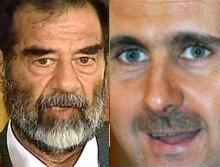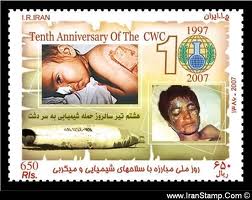 An Iranian war veteran fell into a coma in a Tehran hospital last week after suffering respiratory failure, his lungs ravaged by mustard gas during the Iran-Iraq war 30 years ago.
An Iranian war veteran fell into a coma in a Tehran hospital last week after suffering respiratory failure, his lungs ravaged by mustard gas during the Iran-Iraq war 30 years ago.
Hadi Kazemnejad is one of up to 1,000,000 Iranians who were exposed to chemical weapons by Saddam Hussein’s Iraq, officials say. Between 10,000 and 20,000 people were killed and 100,000 of those who survived have developed illnesses, often chronic.
Cases like Kazemnejad’s point to the long-term damage of chemical warfare and also help explain Iran’s nuanced reaction to allegations regional ally Syrian President Bashar al-Assad used such weapons against his own people.
Chemical attacks on the outskirts of Damascus on August 21, in which an estimated 1,400 people died, have reopened a sensitive debate among Iranians over their country’s support for Syria.
Tehran has provided financial and military support to ensure Assad maintains what it calls the “axis of resistance” against Israel and Arab and Western states. Iran-backed Hezbollah fighters have taken up arms for Assad inside Syria.
Iranians have paid the highest price from any chemical attacks in modern history. Their suffering is etched into the existence of the theocratic state.
In a Facebook posting Iran’s new foreign minister, Mohammad Javad Zarif, condemned the use of chemical weapons, “regardless of its victims or culprits”. The posting received more than 2,000 responses from Iranians at home and abroad, including many critical of Tehran’s unwavering support for Assad.
OBSTACLE OR OPPORTUNITY?
It is a debate that reaches all the way to the office of Iran’s recently elected president, Hassan Rouhani, who is keen to ensure Syria’s civil war does not ruin his chances of making progress in negotiations with the West over Iran’s nuclear program and getting trade sanctions eased, analysts say.
Rouhani has praised Syria’s move to join a global anti-chemical weapons treaty, part of a U.S.-Russia deal that would eliminate Assad’s chemical arsenal.
Iran’s Syria policy is run by Supreme Leader Ayatollah Ali Khamenei, an ideologue who is unlikely to switch his support from Assad. But some diplomats believe if Rouhani is given a stake in the process by Khamenei, Iran could play an important role in helping Syria towards peace.
Iran, they say, has previously shown it can be constructive. As evidence they hold up Iran’s role in the 2001 Bonn conference that paved the way for a transitional authority in Afghanistan.
Iran’s lead representative to those talks was new foreign minister Zarif. According to U.S. diplomat James Dobbins in testimony to the U.S. Congress, Zarif achieved “the final breakthrough.”
In a recent op-ed piece, former Iranian nuclear negotiator Hossein Mousavian – who worked under Rouhani – described the cooperation of Iran and the U.S. in 2001 as a “blueprint for a new collaboration.”
Such a plan faces many hurdles. Opposing even subtle change in Iran’s policy is the Islamic Revolutionary Guard Corps (IRGC), Iran’s hardline and dominant military force which is responsible for delivering support to Assad.
“There are clearly divergent views. It will be interesting to see whether the Rouhani approach or the current hardline policy will prevail,” said Iran expert Ali Ansari at St Andrew’s University in Scotland.
“Rouhani will have to tread very carefully as far as hardliners are concerned. It’s a pity, I think Syria could be a real opportunity.”
In an apparent indication of the suffocating influence of the IRGC, Rouhani told commanders on Monday that the force should “keep their distance from political games”, state news agency IRNA reported.
“VICTIMISED”

Condemning the use of chemical weapons in Syria, Iran also accuses the world of ignoring the plight of its own victims, like Hadi Kazemnejad.
International sanctions against Iran, it says, are complicating access to medicines. Western powers say humanitarian goods such as food and medicine are free from sanctions aimed at forcing Tehran to halt its nuclear work.
“When I saw him yesterday in intensive care, it made me very sad and frustrated to see that our patients who can have a chance to live and breathe are dying because of these sanctions,” said Dr Shahriar Khateri, a co-founder of the Society for Chemical Weapons Victims Support, an NGO.
“They were victimized by Saddam during the war but the world community turned a blind eye to his war crimes and never tried to stop him. When they removed Saddam, our victims expected help but they not only ignored us, they targeted us with sanctions.”
From 1983, Iraqi president Saddam Hussein repeatedly attacked Iran with mustard gas, sarin and tabun to reverse the fortunes of his failed invasion of Iran three years earlier.
A declassified U.S. state department report from Baghdad dated to February 1983 cites an Iraqi military spokesman saying: “The invaders should know that for every harmful insect there is an insecticide capable of annihilating it whatever their number and Iraq possesses this annihilation insecticide.”
Shahriar Khateri says lungs, eyes and skin problems are the most visible conditions but exposure to mustard gas attacks every cell in the body and has left survivors reeling from damage to the immune system, leaving them vulnerable to a wide range of infections and cancers.
Patients have had difficulty finding inhaler medication such as Seretide and Spiriva. There are also shortages of immunosuppressive medications such as Cellcept, Tacrolimus and Sandimmune that are needed to ensure that the immune system does not reject corneal transplants.
BLISTERS
Hassan Hassani was on the battlefield in February 1986 when Iraqi fighter jets bombed Iranian positions. The 19-year-old clambered from the rubble of the building he was in but within an hour he and other soldiers experienced breathing difficulties and burning eyes and skin.
“After a couple of hours, we developed huge blisters on our bodies and I gradually became unconscious,” said the 46-year-old. “I had experience of being under heavy bombardment and artillery fire but seeing how gas can kill and suffocate strong soldiers was a frightening experience. I never forget the horrors of seeing huge, painful blisters on our bodies.”
Behrouz Abbasi was also exposed to mustard gas near the city of Abadan. He has suffered from breathing difficulties since and has undergone specialized corneal surgery because of the damage mustard gas did to his eyes.
“It is a lifetime of suffering, it is like torture,” he told Reuters. “I hate those who make such weapons … and those who use them.”
It is this emotion and fury that unites Iranian survivors, officials and campaign groups.
“Once again breaths are stuck in chests, tears are pouring, bloody coughs have stained the earth and a rain of death has taken hold of tormented people,” read a statement by the Society for Chemical Victims of Sardasht on the events in Syria, a week after they took place.
The statement calls on the United Nations and its partners to launch “humanitarian intervention without delay”, bring an end to the monstrosities and bring to trial the perpetrators.
In the Tehran hospital doctors say war veteran Hadi Kazemnejad’s condition appears to be improving.
“He has woken and is getting better,” said Shahriar Khateri. “But such a condition is unstable and needs careful care. We pray for him.”
Reuters

Leave a Reply
You must be logged in to post a comment.